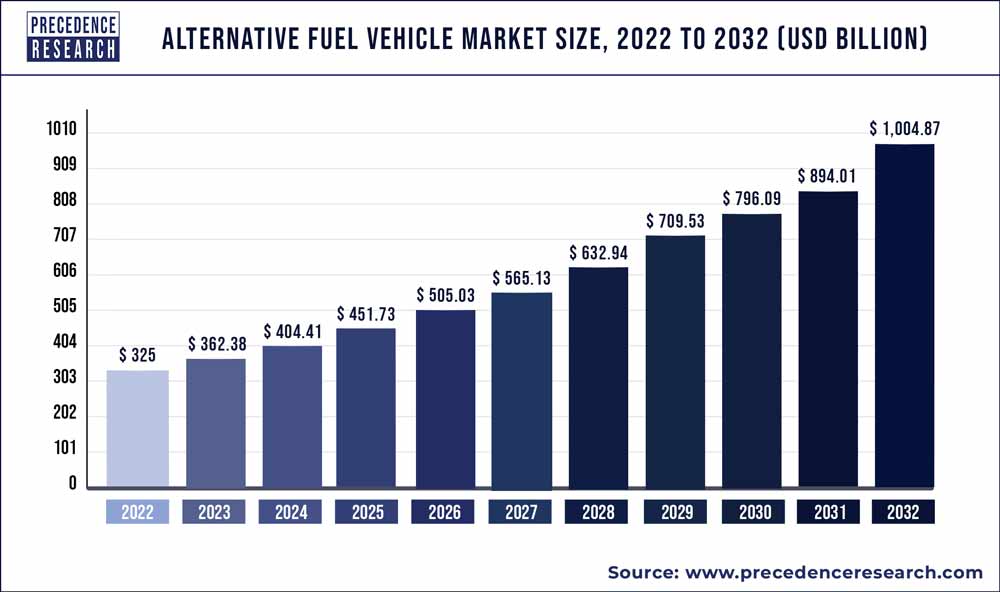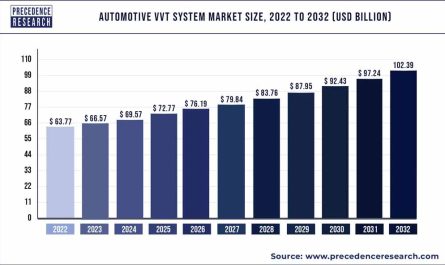The global alternative fuel vehicle market size reached US$ 362.38 billion in 2023 and is projected to attain US$ 1004.87 billion by 2032, poised to grow at a CAGR of 12% from 2023 to 2032.

The Alternative Fuel Vehicle (AFV) market has witnessed significant growth in recent years, driven by increasing environmental concerns, volatile fuel prices, and government initiatives to reduce carbon emissions. AFVs offer a promising solution to mitigate the adverse effects of traditional fossil fuel-powered vehicles on the environment and public health. These vehicles utilize alternative fuels such as electricity, hydrogen, natural gas, and biofuels, offering reduced greenhouse gas emissions and dependence on finite fossil fuels. The global AFV market is poised for further expansion, fueled by technological advancements, expanding infrastructure, and growing consumer demand for eco-friendly transportation solutions.
Get a Sample: https://www.precedenceresearch.com/sample/1409
Growth Factors
Several key factors are driving the growth of the Alternative Fuel Vehicle market. Firstly, stringent emission regulations imposed by governments worldwide to combat air pollution and reduce carbon emissions have incentivized the adoption of AFVs. Incentives such as tax credits, subsidies, and rebates further encourage consumers to switch to alternative fuel vehicles, bolstering market growth. Additionally, advancements in battery technology have led to improved energy density, longer driving ranges, and reduced charging times for electric vehicles (EVs), making them more appealing to consumers. Moreover, the increasing focus on sustainable development and corporate social responsibility (CSR) initiatives has prompted businesses to incorporate AFVs into their fleets, driving commercial adoption.
Region Insights
The adoption of Alternative Fuel Vehicles varies across different regions, influenced by factors such as government policies, infrastructure development, consumer preferences, and economic conditions. In North America, particularly in the United States, the AFV market is driven by federal and state-level incentives, including tax credits, rebates, and grants, aimed at promoting electric and hybrid vehicles. The presence of established charging infrastructure and a growing network of electric vehicle charging stations further supports market growth. In Europe, stringent emission targets set by the European Union (EU) have propelled the adoption of AFVs, with countries like Norway leading the transition towards electric mobility through generous incentives and robust charging infrastructure. Asia-Pacific, led by China, Japan, and South Korea, represents a significant market for AFVs, driven by government subsidies, urbanization, and a growing awareness of environmental issues.
Scope of the Alternative Fuel Vehicle Market
| Report Highlights | Details |
| Market Size in 2032 | USD 1004.87 Billion |
| Growth Rate | CAGR of 12% From 2023 to 2032 |
| Largest Market | Asia Pacific |
| Fastest Growing Market | North America |
| Base Year | 2022 |
| Forecast Period | 2023 to 2032 |
| Segments Covered | Vehicle Type, Fuel Type, Region |
Opportunities
The Alternative Fuel Vehicle market presents numerous opportunities for manufacturers, suppliers, and stakeholders across the value chain. One key opportunity lies in technological innovation, particularly in the development of advanced battery technologies, hydrogen fuel cells, and lightweight materials, which can enhance the performance, efficiency, and affordability of AFVs. Expanding infrastructure for alternative fuels, including charging stations, hydrogen refueling stations, and biofuel distribution networks, presents another opportunity for investment and market expansion. Furthermore, collaborations between automotive companies, energy providers, and government agencies can accelerate the deployment of AFVs and support the transition towards sustainable transportation solutions.
Challenges
Despite the promising growth prospects, the Alternative Fuel Vehicle market faces several challenges that could impede its expansion. One of the primary challenges is the high upfront cost of AFVs compared to conventional internal combustion engine vehicles, which remains a barrier to mass adoption. Limited driving range and the lack of charging or refueling infrastructure in certain regions also pose challenges, particularly for electric and hydrogen-powered vehicles. Moreover, concerns regarding the availability and sustainability of alternative fuels, as well as issues related to battery recycling and disposal, require comprehensive solutions to ensure the long-term viability of AFVs. Additionally, market fragmentation, regulatory uncertainty, and geopolitical factors such as fluctuations in commodity prices can impact investment decisions and market dynamics.
Read Also: Vehicle Tracking Systems Market Size USD 80.17 Bn by 2032
Some of the prominent players in the global alternative fuel market include:
- Volkswagen AG
- Toyota Motor Corporation
- Tesla Motors
- AUDI AG
- BMW Group
- General Motors
- Ford Motor Company
- Honda Motor Co., Ltd.
- BYD Company Limited
- Daimler AG
- Zero Motorcycles, Inc.
- Nissan Motor Corporation
- Mitsubishi Motors Corporation
- Nikola Motor Company
- Renault
- Tata Motors
- Polaris Industries
- Scania
Segments Covered in the Report
By Vehicle Type
- Passenger Vehicle
- Commercial Vehicle
By Fuel Type
- Electric
- Biofuels
- Gas Fuels
By Geography
- North America
- U.S.
- Canada
- Europe
- U.K.
- Germany
- France
- Asia Pacific
- China
- India
- Japan
- South Korea
- Rest of the World
Contact Us:
Mr. Alex
Sales Manager
Call: +1 9197 992 333
Email: sales@precedenceresearch.com
Web: https://www.precedenceresearch.com
Blog: https://www.expresswebwire.com/

